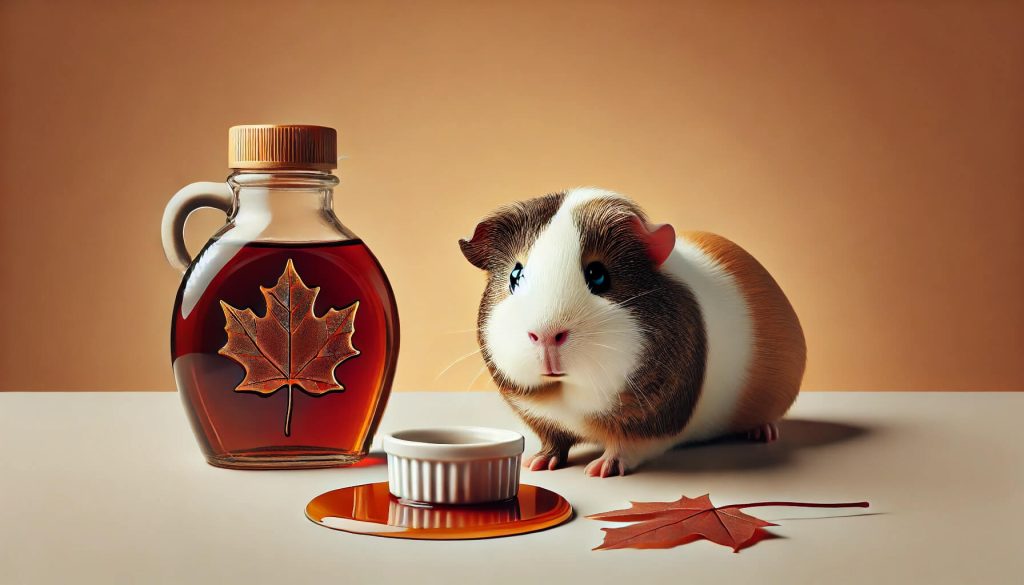
Can Guinea Pigs Eat Maple Syrup?
Overview of Guinea Pig Diet Requirements
Guinea pigs have specific dietary needs to maintain their health. Understanding their diet helps in preventing health issues and ensuring their well-being.
Nutrients Essential for Guinea Pigs
- Vitamin C: Guinea pigs can’t produce vitamin C, so include sources like bell peppers and kale.
- Fiber: A high-fiber diet aids digestion. Hay, especially Timothy hay, is crucial.
- Protein: Necessary for growth and maintenance, found in leafy greens and hay.
- Calcium: Important but requires moderation. Overconsumption leads to urinary issues; feed sparingly with foods like parsley and spinach.
- Water: Fresh water must be available at all times.
- Hay: Always provide fresh Timothy hay. Orchard and meadow hay work too.
- Vegetables: Generally safe choices include bell peppers, cucumbers, and green leaf lettuce.
- Fruits: Offer in moderation. Apples, blueberries, and strawberries are good options.
- Pellets: Choose guinea pig-specific pellets fortified with vitamin C. Limit to 1/8 cup daily.
- Treats: Occasionally give small quantities of oats, barley, and commercial guinea pig treats.
Adhering to these dietary guidelines ensures your guinea pig gets the necessary nutrients for a healthy life.
Can Guinea Pigs Eat Maple Syrup?
Guinea pigs have sensitive digestive systems requiring specific dietary guidelines. It’s essential to assess the safety of human foods, such as maple syrup, before offering them to your guinea pig.
The Sugary Nature of Maple Syrup
Maple syrup, a sweetener derived from the sap of maple trees, contains high levels of sugars like sucrose. Guinea pigs, which need low-sugar diets, may struggle to process such sugary substances. Unlike fruits, whose fructose works better with their systems, maple syrup poses a higher risk due to its concentrated sugar content.
Potential Health Risks
Consuming maple syrup can lead to various health issues for guinea pigs. High sugar intake can cause obesity and disrupt gut flora, resulting in digestive problems such as diarrhea and bloating. Additionally, sugary diets can lead to dental issues, including tooth decay and gum disease. Given these risks, it’s advisable to avoid giving maple syrup to guinea pigs, ensuring their diet remains safe and healthy.
Safe Treat Alternatives for Guinea Pigs
Guinea pigs enjoy variety in their diet, but it’s crucial to choose safe treats for their well-being.
Recommended Fruits and Vegetables
Ensure you provide fruits and vegetables that are safe for guinea pigs. Examples include:
- Bell Peppers: Provide vitamins and are easy to digest.
- Carrots: Offer in moderation due to sugar content.
- Cucumbers: Hydrate and low in calories.
- Apples: Remove seeds; serve occasionally.
- Blueberries: Rich in antioxidants; moderate portions.
- Small Quantities: Start with tiny amounts to assess tolerance.
- Observation: Monitor closely for adverse reactions like diarrhea.
- Variety: Rotate treats to ensure a balanced diet without overloading on sugar or certain nutrients.
- Cleanliness: Wash all fruits and vegetables thoroughly to remove pesticides.
Conclusion
It’s crucial to prioritize your guinea pig’s health by adhering to their dietary needs and restrictions. While it might be tempting to share treats like maple syrup, it’s best to avoid human foods that can harm their sensitive digestive systems. Focus on providing a balanced diet with Timothy hay, safe vegetables, and guinea pig-specific pellets. Remember to offer fruits in moderation and always monitor for any adverse reactions. By choosing appropriate treats and maintaining cleanliness, you ensure your guinea pig stays happy and healthy.
